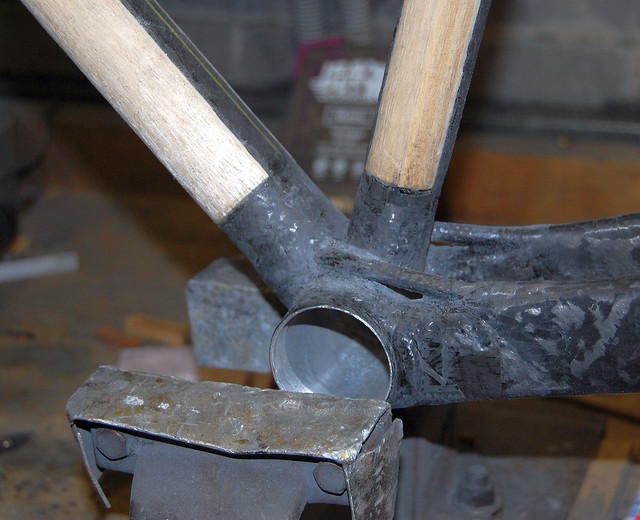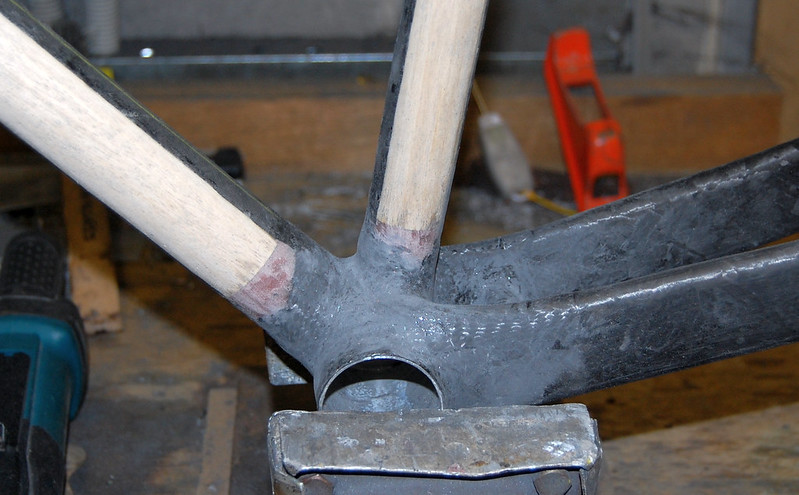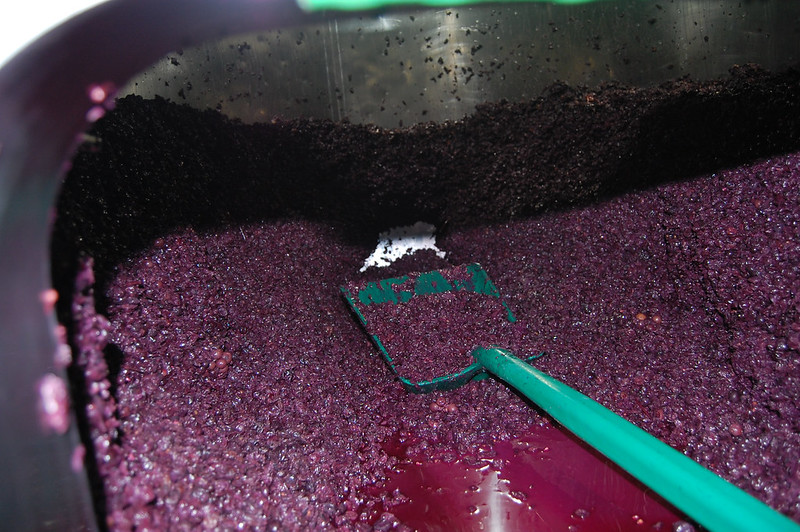Dear Guest,
Please register or login. Content don't create itself!
Thank you
-
 Re: Lyrebird Cycles
Re: Lyrebird Cycles
An article on the lesser known of the two species of Lyrebird in The Conversation today:
https://theconversation.com/listen-t...eard-of-177627https://theconversation.com/listen-t...eard-of-177627.
I've never seen an Alberts but there is apparently a population near my sister's place so I live in hope.
Mark Kelly
-
 Re: Lyrebird Cycles
Re: Lyrebird Cycles

Inside Out
If the internal cable routing comes out of the frame and then back in again, is it still internal?
My solid cored chainstays preclude standard internal cable routing; I use 7mm ID carbon tubing from the down tube to the exit points.
The idea here is to avoid sharp bends: there are three long radius bends in the whole thing, each of which is 15 degrees or less so feeding cable through is a doddle.
Mark Kelly
-
 Re: Lyrebird Cycles
Re: Lyrebird Cycles

Originally Posted by
Mark Kelly

 Inside Out
Inside Out
If the internal cable routing comes out of the frame and then back in again, is it still internal?
My solid cored chainstays preclude standard internal cable routing; I use 7mm ID carbon tubing from the down tube to the exit points.
The idea here is to avoid sharp bends: there are three long radius bends in the whole thing, each of which is 15 degrees or less so feeding cable through is a doddle.
OK,cunning. But how in god’s name do you do the latest joint aesthetics with those tubes “in the way”?
-
 Re: Lyrebird Cycles
Re: Lyrebird Cycles

Originally Posted by
Colinmclelland

OK,cunning. But how in god’s name do you do the latest joint aesthetics with those tubes “in the way”?
Much filleting required, still in progress. I'll post a pic when I'm done.
Mark Kelly
-
-
 Re: Lyrebird Cycles
Re: Lyrebird Cycles

Originally Posted by
Colinmclelland

OK,cunning. But how in god’s name do you do the latest joint aesthetics with those tubes “in the way”?
Because the tubes are carbon they are quite fragile so they are protected by burying them in filleting compound.

220507
The whole joint is then given its second carbon wrap, encompassing the filleted tubes

220519
The purplish looking filler smooths the junction between the wood and the carbon so that the next layer of wood doesn't split when I try to make it take a compound curve.
Mark Kelly
-
 Re: Lyrebird Cycles
Re: Lyrebird Cycles
Is the wrap done with the Textreme tape?
Chikashi Miyamoto
-
 Re: Lyrebird Cycles
Re: Lyrebird Cycles
No, that only arrived today (Thanks Chik). This was done with standard twill fabric and unidirectional ribbon which I make into quasi prepreg (I've covered the process involved here before).
Mark Kelly
-
-
 Re: Lyrebird Cycles
Re: Lyrebird Cycles

Originally Posted by
Mark Kelly

...Shiraz and Viognier from the best bits of the vineyard...
Keen to know the winery (and which from their range is 'the good stuff') to see if your wine making is up to snuff Vs your bikes!
-
 Re: Lyrebird Cycles
Re: Lyrebird Cycles
Another of my red lines I'm afraid: I am not here as a rep for the winery.
Mark Kelly
-
 Re: Lyrebird Cycles
Re: Lyrebird Cycles
More bookmatching, this time in "smoked eucalyptus"

Bookmatch
Mark Kelly
-
-
 Re: Lyrebird Cycles
Re: Lyrebird Cycles
I want to ride that bike so badly.
-
 Merch
Merch
Ya gotta have merch, they said.
Doesn't sit well with me to sell something I wouldn't use, so for a long time I haven’t had anything.
A while ago I was cleaning something with a commercial solvent degreaser and I thought to myself “Why am I using this toxic rubbish? I could do better and it would be a lot greener”.
Warning: rabbit hole.
I have a fairly strong background in chemistry and for fairly obvious reasons I have brought myself up to speed on the surface chemistry that governs bonding between dissimilar materials. Less obviously, the same chemistry governs the interactions between solvents and things that you might want to dissolve (like grease).
My basic approach was to get as close as I could to the performance of trichloroethylene using Hansen’s solubility theory using only bio based renewable materials. The end result is a blend of methyl oleate, a surfactant (derived from oleate), ethanol and eucalyptus oil. It’s pretty good (and it smells great) so I thought: I could sell this.
A while later I was using the degreaser to clean something off my hands and I thought “You really shouldn’t do that” so I set about developing a hand cleaner.
Now that really was a rabbit hole but I ended up with something I really liked by toning down the degreaser, adding some emollients, stabilising the emulsion and adding some scrubbing agents. I used ground green coffee beans and tea tree leaves so the stuff started out Kermit green then went baby poo brown. Not a good look.
In the end it doesn’t matter because I cannot sell it: anything intended to clean human skin is classed as a cosmetic and requires a current Cosmetic Manufacturer’s Licence.
Bugger.
But wait: there are more rabbit holes ahead.
One of the emollients with which I was experimenting was jojoba oil, which is also a fantastic lubricant: the closest thing to the legendary sperm oil for which most of the world’s sperm whales were killed. The jojoba wouldn’t have made it into the hand cleaner, it’s simply too expensive, but it occurred to me that a better use for the esters that give jojoba its properties would be to improve the lubricity of chain wax since true waxes are also long chain esters. Paraffin “wax” isn’t a true wax so it doesn’t count.
Another component that was also originally derived from sperm whales is cetyl alcohol, which is commonly used to lubricate things such as bolt threads because it has outstanding performance under extreme pressure. It’s also used in hand cleaners and the like to protect skin as it is slippery without being greasy. Cetyl alcohol is basically half of the ester that is the principal component of spermaceti, cetyl palmitate, though fortunately we now get it from coconut oil rather than bucketing out the heads of dead whales (that's really what they did).
The first choice of true wax is carnauba, famous for making excellent polishes. The things that make it such a good polish also work for chain lubrication: the molecular structure of the wax esters create nanoscale slip planes due to the presence of planar phenolic acids rather than straight chain fatty acids (interestingly, they are also chemically related to the tannins in wine).
Carnauba is very hard and brittle so it tends to crack and flake off rather than stick where you want it. Adding some soy “wax” makes the blend more pliable and more adherent (and thus less messy). The quote marks are because this isn’t actually a wax, it should be called soy tallow.
The four of them together make an excellent chain wax that is again totally renewable and plant based. It is, however, quite expensive to make compared to a petrochemical based wax: the principal ingredient, carnauba wax, is around ten times the price of paraffin “wax” and jojoba esters are around twenty times the price. I called the result "Glide Wax"
I also tried softening this and suspending it in a solvent to use as a top up wax, which I called "Wax Solution"
In the process of developing the wax I was looking at recent developments in lubricant technology and especially the use of graphene. It occurred to me that since graphene works as a lubricant by binding to the surface and providing slip planes, the best performance should be achieved by pre-treating the chain with graphene in a carrier then applying wax over the top. The fact that the graphene can’t move through the wax should then become a benefit rather than a hindrance as it will reduce the tendency of the lubricant to dislodge the graphene.
I found an Australian company that specialised in making extremely high quality graphene for lubrication and we went from there. The graphene is made from natural gas which is not renewable and the manufacturer supplies it dispersed into a carrier fluid which is also petrochemical based. On the other hand the prep + wax package as a whole uses approximately 97% less petrochemicals than a typical paraffin based formulation.
You never know, if we sell tons of the stuff we could get the graphene manufacturer to move to renewables. In my dreams. Oh and if you thought jojoba was expensive, try graphene. At about $1k for 10 grams it would be cheaper to use 24k gold than the grade of graphene I’m using.
Fortunately 0.3 ml of the prep is enough to treat an entire chain, so that’s 3 uL per link (I use a 1 ml syringe with a micro drop tip to achieve this). One tiny bottle will do 100 chains.
I launched all these at the Handmade Bike Show this weekend, we'll see how they go.
BTW I haven’t bothered making a wet lube: use Green Genie.
Also I'm not going to export, I can't send two of the products by air as they are classed as flammable liquids.
Mark Kelly
-
 Re: Merch
Re: Merch
Sell the hand cleaner as a degreaser that's gentle on your hands. Done.
Chikashi Miyamoto
-
 Re: Merch
Re: Merch
Hey that's not bad, if I work out how to stabilise the colour I might go back to it.
Mark Kelly
-
 Re: Lyrebird Cycles
Re: Lyrebird Cycles
You should tell Instagram…
-
 Re: Lyrebird Cycles
Re: Lyrebird Cycles
I've been trying to do product shots but they are woeful, even by my standards.

Graphene_poor lighting
I think I need more lighting and a darker background.
FWIW the syringe is used as the applicator because you only need 0.3 ml to do a full chain so that's < 3 μl per link. It's very hard to achieve a 3 μl drop size: a normal drop is 50 - 80 μl
Mark Kelly
-
 Re: Lyrebird Cycles
Re: Lyrebird Cycles
How does your Glide wax compare to molten speed wax?
I used the Solvol liquid hand cleaner about 3 times today, so if you had a degreaser that i could misuse as a hand cleaner, i’d be a buyer!
Colin Mclelland
Similar Threads
-
By Boedie in forum Smoked Out
Replies: 30
Last Post: 11-22-2014, 05:45 PM
-
By magnoliacycles in forum Smoked Out
Replies: 25
Last Post: 04-11-2011, 04:57 PM
 Posting Permissions
Posting Permissions
- You may not post new threads
- You may not post replies
- You may not post attachments
- You may not edit your posts
-
Forum Rules


 Likes:
Likes: 


 Reply With Quote
Reply With Quote











Bookmarks